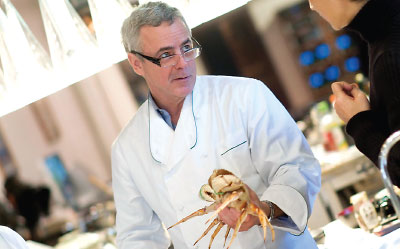A Chef and a Psychiatrist Walk Into a Kitchen … and Talk About Food and Mental Health
Abstract
The effects of the foods we eat—and how they are prepared—is a complex subject, but two psychiatrists, an agricultural researcher, and a famous New York City chef will sort it all out for Annual Meeting attendees.

Chef David Bouley believes that the right foods can improve health, strengthen the central and peripheral nervous systems, and be enjoyable and fun.
The stomach and the mind have become closer friends in recent years as researchers have explored the connections between the gut microbiome and the brain. Now a world-famous chef and several psychiatrists with a great interest in food will do their best at APA’s 2020 Annual Meeting to explain how the foods we eat can influence our mental health.
The first session features a talk by renowned New York chef and restaurateur David Bouley. He will discuss the effects of food on mental health and how good foods can improve health and strengthen the central and peripheral nervous systems. The ingredients in a meal can combine to create a whole that is more than the sum of its parts nutritionally, according to Bouley.
A few years ago, Bouley took a break from running his restaurants to travel around the world and experience other cuisines.
“We realized that we needed to learn about the science of cooking and how we can serve people a meal where they’re not going to have any side effects, where they’re going to have an enjoyable and fun evening.”
The journey took him to Japan, where he learned more about fermented foods. These foods, which he believes are more healthful, included cultured butter; kurozu (black vinegar made by fermenting unpolished rice), and traditional fermented foods like sunki, a rare kind of pickle made without using salt.
Chef Bouley will present a video of cooking techniques prepared expressly for the APA meeting. It will feature techniques using fresh foods that can be done at home while he describes in detail what each technique does and its health benefits.
He often holds discussions at his Bouley Test Kitchen with psychiatrists and other physicians on the latest science connecting food to brain health, followed by a five-course “wellness-inspired” dinner.
Among his recent collaborators is Drew Ramsey, M.D., an assistant clinical professor of psychiatry at Columbia, who will be one of the panelists in the morning’s second session. Ramsey founded the Brain Food Clinic in New York City, which offers consultation and treatment for depression, anxiety, and emotional wellness concerns.
“We want to talk about how what one buys and what one eats and how one prepares food can raise the level of one’s dietary lifestyle in order to maintain mental health or reduce the risk of mental illness,” said session chair Philip Muskin, M.D., M.A., a professor of psychiatry at Columbia University and chair of APA’s Scientific Program Committee. “Healthy eating doesn’t have to be boring.”
Another panelist is Uma Naidoo, M.D., an instructor in psychiatry at Harvard Medical School and director of Nutritional and Lifestyle Psychiatry at Massachusetts General Hospital—and a Cordon Bleu–trained chef.
Muskin asked Naidoo about a diet that was nominally healthful but not so enjoyable. Naidoo used her Cordon Bleu–training to rework the diet to add flavor and make it delicious. She believes: “If you don’t enjoy food, you won’t eat it.”
Brain-healthy foods don’t always have to be exotic, said Naidoo. A simple baked salmon crusted with walnuts and accompanied by some sautéed spinach and glazed sweet potatoes can be managed easily in any home kitchen.
Panelist Raymond Glahn, Ph.D., is a nutritional physiologist at Cornell University and the U.S. Department of Agriculture. His work serves as a bridge between agriculture and human nutrition by focusing on plant breeding and processing to improve the nutritional quality of food crops. Glahn studies the bioavailability of trace minerals, especially iron and zinc. Deficiencies in those minerals lead to poor growth and development, poor cognitive development, and reduced resistance to disease, among other problems.
Muskin said that recent research is pointing out ways that diet affects mental health. For instance, women who eat lots of high-glycemic-load foods have trouble sleeping, and eating more dark chocolate may lessen the risk of depression. Unsurprisingly, controversy remains, said Muskin. “There’s a ton of data—some are good, some really stink.” ■
“The Living Pantry Part 1: Food, Nutrition, and Mental Health” will be held Sunday, April 26, from 8 a.m. to 9:30 a.m. “The Living Pantry Part 2: Food, Nutrition, and Mental Health” will follow at 10 a.m.



